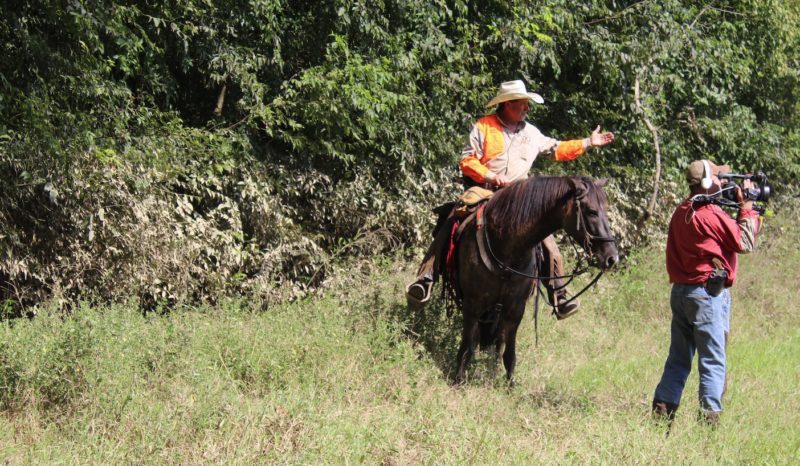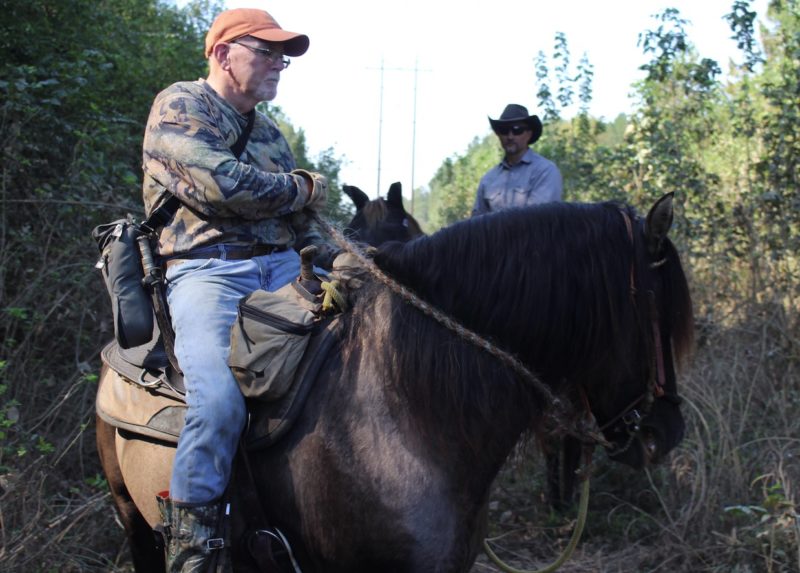This past week, I had the good fortune to spend several days with my SEOPA ‘family.’ It was the annual gathering of the Southeastern Outdoor Press Association, a group of 100-plus communicators and corporate members who share a love of hunting, fishing and the great out-of-doors.
The SEOPA membership stretches from Texas to Florida to Virginia and the annual meetings are moved about each year. When I learned this year’s meeting would be in Florence, South Carolina, just two hours from my home, I was dead-set on making it.
But as Hurricane Florence was making landfall a few days before, we weren’t at all sure that the meeting would go on as planned. Fortunately, the city of Florence received only a glancing blow. But just east of there, homes and lives were destroyed, and the Pee Dee and Waccamaw Rivers were just beginning to recede.
On Thursday, I was able to witness some of the destruction from a saddle hitched to a Marsh Tacky stallion named D.P. I had been invited to join David Grant, owner of Carolina Marsh Tacky Outdoors and host of Horse Tales www.horsetalestv.com for a wild ride through the Pee Dee swamp in pursuit of wild hogs.
Joining us were hands Greg, Eric and Ashley, cinematographer Richard, and a motley crew of six dogs.
“If it weren’t for the dikes built back in the 1800’s, this would still be underwater,” David assured me, pointing to the pools of water still standing in the soybean fields. He said that until slavery was abolished, the dikes were a necessity for safeguarding the cotton fields from flooding. But after the War Between the States, the plantation way of life faded away and the dikes were no longer maintained. Nevertheless, the tree-covered barriers still stand a century and a half later.
For someone who rarely rides horseback, it was an adventure that left me with pains in places where I’d forgotten I had places. But the soreness has since gone away, while the wonderful memories will stay with me for as long as my mind still can remember.
Following the baying dogs, we rode through creeks and sloughs, thickets and soybean fields for nearly six hours. Sometimes called “the Army jeep of horses,” the Marsh Tacky is a piece of history in itself. The diminutive, shaggy-browed breed is a descendant of Spanish mounts brought to the New World more than 500 years ago.
The Marsh Tackies were also part of Francis Marion’s guerrilla warfare against the British during the Revolutionary War, in the very swamps we were riding through. I couldn’t help but imagine brandishing a sword and musket after having set upon an unsuspecting garrison of red coats.
What was abundantly clear during our hunt was that the flooding had been beyond anything I could ever have imagined. The mud line from the cresting of the Pee Dee River could be seen on foliage a good eight feet above the ground. The dikes were the last hope for many animals living along the river bottoms. Carcasses of hogs and deer were scattered along these last refuges where they’d either starved or drowned.
Nevertheless, we saw deer bounding through the soybean fields as we arrived for our hunt that morning. And hog tracks were stamped into the mud most everywhere we turned. The wildlife in these parts have seen it all and bounced back from catastrophes more often than we’ll ever know.
Despite the plentiful hog sign, David explained the pigs have learned to keep running from the dogs when they hear them coming. They used to turn to fight, giving the dogs a chance to grab their ears while one or two hunters grabbed the hindlegs and the knife man dispatched the porker with a deep stab to the neck. They’ve since wised up and as David put it, “Team Marsh Tacky has already caught all the slow of mind and foot feral hogs.” Nonetheless, we did manage to run down one feral pig, giving these energized dogs a fresh shot of adrenaline.
As the fellows rounded up the dogs and trailered the horses, we discussed the bad news that had occurred the previous day, October 3rd, just five minutes from David’s farm. It was another policeman killed in the line of duty. Six more wounded. It made national news, but I was unaware until the men discussed it. David said they could hear the shooting from the stables. It was later that he learned an unsavory acquaintance, 74-year-old Fred Hopkins, had, allegedly, set up an ambush in the top floor of his 6000-square-foot home.
The police arrived with a search warrant involving possible charges of sexual abuse by the shooter’s adopted son, Seth. He was one of nine foster “children” in the home. The elder Hopkins, allegedly, opened fire with a semi-automatic weapon, picking off officers one by one.
Flags flew at half-mast as we drove from the Pee Dee swamp toward David’s farm near Florence. There, he and Greg began getting the dogs and horses cleaned, fed and settled. After many handshakes and promises to come back when it was less than 90 degrees, I returned to the hotel for a much-needed shower and a handful of Tylenol.
The following evening, at the Florence Civic Center, SEOPA’s dinner and auction was held. I bought my traditional fifty bucks worth of tickets for the drawings and, as usual, won nothing. The auction included plenty of fishing and hunting supplies, along with a few trips to exotic places like Arkansas and Mississippi. “Exotic” that is if you love to hunt and fish.
The final auction item of the night was a hat – a handsome western camo lid belonging to long-time SEOPA member Captain Sammie Faulk of Louisiana. Once sold, it was then passed around from table to table. In five minutes, it was overflowing with more than $1200 in cash. All to help the law enforcement families affected by the tragedy from two days before.
It’s clear these lovers of wildlife and wild places also have a soft spot in their hearts for every day heroes.
Learn more about the Marsh Tacky, the state horse of South Carolina, at www.carolinamarshtacky.com.



